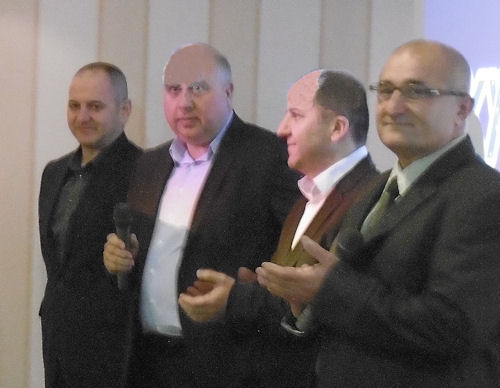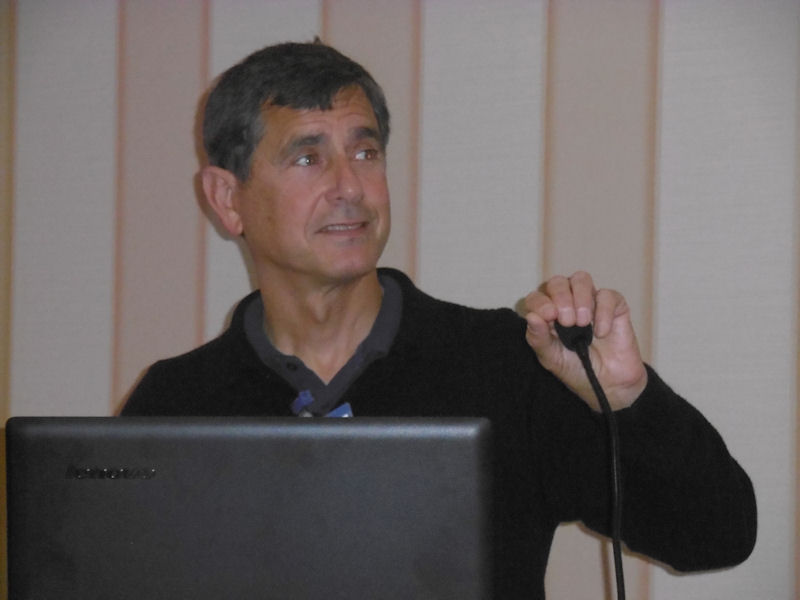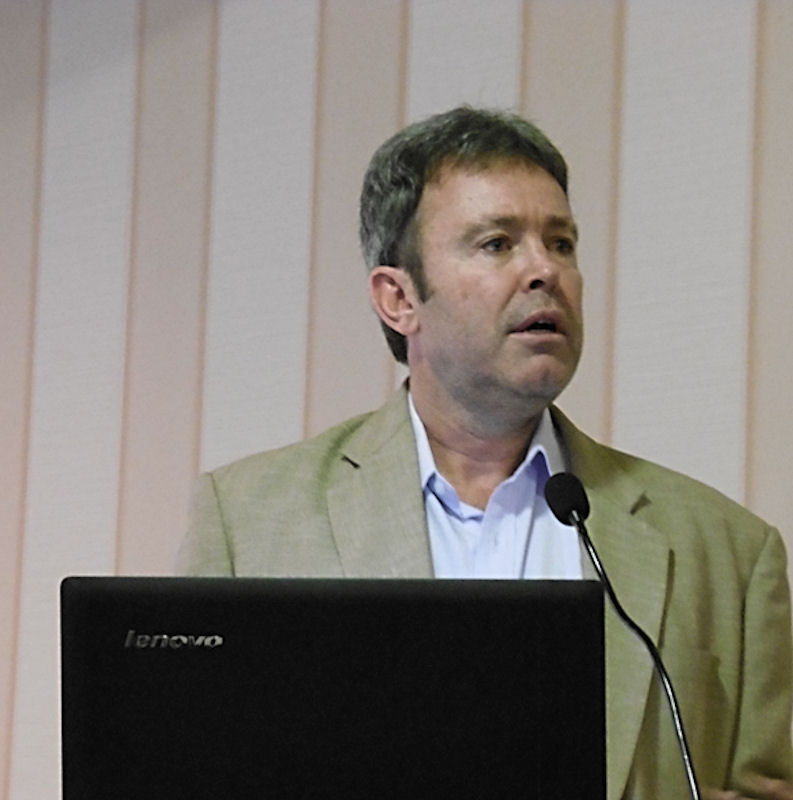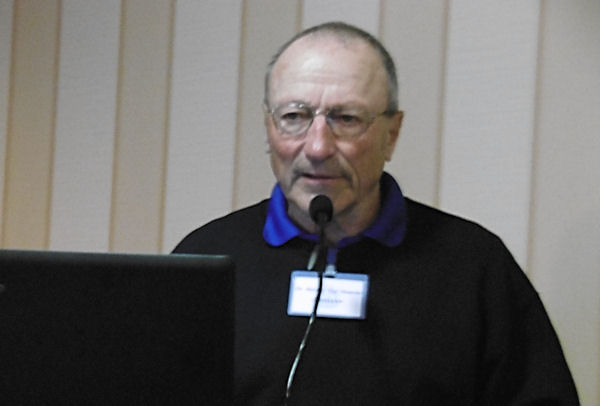65th IPC Plenary - Varshets, Bulgaria - Day 1 28th January
Day 1 of the Open meetings which precede the formal Plenary. These meetings are an opportunity for the Bureau and Committees to present their plans for changes and the future – and the meeting is then open to general discussion and allows the Bureau and Committees to formalise their presentations for the actual Plenary.
Welcome to the various sponsors of the Plenary meeting – local dignitaries, Anatoli Dimitrov, Municipal City Counsel Member, Mr. Stanislav Stanoev, owner of the Hotel (ATASPA) and a sponsor of the local parachute club, AC Montana and they were presented by Angel Stamenov, vice-president of the Bulgarian National Club..

Ivan Lazarov The Mayor of Varshets then welcomed the delegates to the 65th Plenary meeting.
Graeme then welcomed everyone to the meeting and told us about his busy year – which is covered well in his report. He started the year with a trip to Morocco and then to Tanay in Russia – followed by a quick trip home and then to Lausanne and the FAI to learn that the World Air Games would happen this year – in Dubai. Graeme then covered the World Championships this year starting with Banja Luka and publically thanked Patrice Giradan for helping beyond his role as FAI Controller, when the Meet Director could not attend due to ill health. Graeme then moved on to the World Championships in Prostejov. He thanked Martin for all his work in such a successful World Championships. The busy year then continued with the CISM and ASIANA and wonderful competitions.
Graeme then moved on to the General Conference of the FAI and commented on the new personnel in the FAI and looks forward to a really good future working together. At the end of the General Conference two of the IPC Bureau members were elected onto the Executive Board, Gillian Rayner and Niels-Christian Levin Hansen.
Then onto the USA for the Canopy Piloting World Championships with an impressive scoring system which allowed everyone on the drop zone to keep track of the results as they happened. Next was the 1st Indoor Skydiving World Cup in Austin, Texas. Graeme spoke about the emotional impact of watching young people (children) flying 4 way sequential in the tunnel.
The last big competition of the year was the trip to Dubai for the 5th DIPC – impressive as always and now he was in Varshets for this meeting.
He then moved onto the future – and started with the Strategic Plan - a living document and always being looked at and reviewed. In view of the changes that will happen to the bureau Graeme set the priority to review and revise the Strategic Plan. He then referred to the FAI Vision Statement and expressed the concern of IPC to the use of “safe” air sports, and although parachuting will continue to work at making the sport as safe as possible, but this cannot be certain and is why the IPC is not totally happy with this statement.
Graeme moved on to Media Presentation and Marketing and the committee needs to be resurrected from the Marketing point of view and IPC needs to expand on this area to find sponsors and there is a need for someone to take hold of this marketing aspect. Graeme asked the delegates if they knew of anyone who could look after marketing and promotion. Ronald Overdijk said that there are marketing companies who would be prepared to do this on a no fee basis.
Lots of events taking place and we need to watch the timing of these events so they do not clash, even with other large events outside our sport.
Graeme moved on to the fact that young people were now involved in our sport and it is necessary for the FAI and IPC to look at the child protection measures taken by other sporting bodies.
Finally he talked about the new media and promotion from Skydive TV and have already been welcomed by USPA, a company of skydivers with experience in this field. Internet TV coverage of events, and they came to IPC to present the World Championships at Z’Hills, Canopy Piloting.
10.00 28th January, 2015

Safety and Training presented by Niels-Christian Levin Hansen and talked through the lack of information coming to the committee for the annual report which covers a world wide collection of statistics. The committee continues to work with PIA to work together to provide information on equipment problems. During 2015 there was only one Information Notice published by the committee. Niels-Christian then moved to the Certificates of Proficiency and the fact that Hungary has a parachutist who has issued his own Certificate of Proficiency – and Niels-Christian asked all delegates to report back and warn Drop Zones in their country of this forgery and the risks involved.
Jiri, Czech Republic talked about the acceptance between nations of each other’s licences and asked that the committee worked on this during the coming year. Niels-Christian answered that they would but it was difficult to get agreement across the board. Patrice Giradin, France then said he felt that this was not something to be driven from the top but up to each NAC (Parachuting authority) to contact their neighbours and other authorities to reach agreement on acceptance of each other’s certificates of parachuting competence.
Niels-Christian thanked his committee for their work.
10.30 28th Jauary 2015

Doris Mertz then presented the Treasurer’s report and covered the problems she had with obtaining the final figures for the year from the FAI. She should have all the information for the Plenary meeting later in the week. Doris then went through the figures for the year, talking through the slide presented to all members. The income and expenditure balanced well for 2014, as the objective of IPC is not to make a profit or lose money. Doris then moved on to the breakdown of the expenses for Judges and Jury during 2014 by competition.
Doris then spoke about the proposals for 2015 of the working group. She moved first to the IPC re-imbursement policy. The budget cannot be presented until the end of the Plenary as it is necessary to wait until the Plenary agree where the competitions will be held in 2015.
The finance committee proposed the ability of a judge to opt to travel even if this includes an overnight stay to keep the lowest cost and this no longer needs Bureau approval. It is also proposed that if the travel costs are not capped, it is proposed that the flight costs can be reclaimed before the event, providing travel insurance is taken. The committee proposed to increase the caps for travel to – within country 400 euros, within continents 600eEuros and intercontinental 1,800 euros, Judges would still be obliged to find the cheapest form of travel.
John Smyth said the BPA totally approved this proposal. Jan Anderson, Finland, said he thought it was too high and was concerned that the sanction fee was not increased. He asked if it was possible to change the re-imbursement policy to allow for a Judge to purchase as early as possible to get the lowest price.
Buzz then presented the fact that the 2013 statements have finally been finalised.
There was then a much needed coffee break.
11.45 28th January 2015

Wingsuit Working Group – Jim Hayhurst presenting.
Jim introduced the various discussions held to introduce the two new events and the conclusion to call the first of the new event of Acrobatic Wingsuit Flying – it is under skydiving ie exiting from an aircraft and ending the flight with an open parachute, but between flight using a wingsuit – across the sky.
Jim then introduced Zach Schroedel who talked about the history of Acrobatic Wingsuit Flying competitions and there have been about 30 competitions around the world. Not only has he worked as a competitor, he has also worked on developing a judging system that gave a fast turnaround of jumps. The competition consists of compulsory moves which are developed to accommodate different levels. The presentation was continued by Jarno Cordia.
They then showed a short video demonstrating some of the compulsory moves. The question was asked by Ron, Israel, as to whether there was restriction on the wingsuit used – and the answer was no. How can it be judged, no problems using experienced judges in either FS or AE. Suit selection is down to the flyer. There are plans in place to transition FAI judges in other aerial disciplines to Wingsuit judging and the committee believes this would take a year to achieve. There were also questions from the floor about the need to have two levels of judges for Performance and Acrobatic, so judges would probably need to be parallel ratings.
A question was asked on the published competition rules regarding an intermediate level and Jim confirmed that in fact the actual competition rules that will be presented at the end of the week for the Plenary as an Open only event. The second question was the number of entrants at the competitions and the UK answered that the UK Nationals were represented by 20 competitors.
By combining both disciplines in the same competition the committee has experience of competition in Europe they had over 100 wingsuiters on the drop zone.
After a little more discussion from the floor, Jim then moved to Performance Wingsuit Flying. He then called Klaus Rheinwald to the front to explain. Again he presented from the 1st event held in 2004 with 13 competitors until 2014 with 4 different competitions, and a Wingsuit Performance Series. Jackie Harper, the reigning top Wingsuit Performance Flyer, was present at the plenary.
The criteria is now to fly as fast as possible, as far as possible and to stay up as long as possible, and these are combined to give the best overall performance.
There was a suggestion from the floor that each element be recognised by medals as well as an overall position. The working group will discuss this and present at the Plenary.
Patrice Giradan, France asked why the scoring system is complex and difficult for the public to understand, and it is not immediately dynamic.

John Smyth from the UK spoke about his experience as a new person visiting a competition for the first time, it was an exciting and dynamic competition.
Klaus then covered the judging element. It is judged using GPS system fitted to the flyer, and when handed in and downloaded the result is available within a few seconds. During a flight the flyer can cover 4.5 km and so the safety regulations are clear and presented well in the supporting documents with the Agenda.
John Smyth, UK then presented a bid from the UK for a 1st World Cup of Wingsuit Performance Flying – if Wingsuit Flying is accepted as a new discipline by the Plenary, then this would be on the table for consideration by the Plenary. The bid is presented by the BPA on behalf of the Army Parachute Association at Netheravon, UK.
Jackie Harper is not only the Series World Champion in Wingsuit Performance Flying is also the Secretary of the Army Parachute Association. Jackie then presented the history of wingsuit flying competitions at Netheravon culminating in the British Nationals last year with over 60 competitors and 7 Nations represented.
Jackie made a very empassioned presentation on the facilities that are on offer and has already put into place sponsorship and media coverage, good internet access etc. The pack is included with the Agenda. One of the points raised by Jackie is the support they have from other DZ's around the world who have the potential to run this competition. She then called for questions. Buzz Bennett of Canada asked about the difference between the Head of Delegation price compared with the Accompanying Persons. Jackie's answer is that this is a provisional budget. Buzz says that for a decision to be made by the Plenary must have a absolute figures. He then went on to the insurance requirement of the BPA, and questioned if, for example, Canada already has sufficient insurance. Jackie and John understood to clarify the various questions on Insurance, and the need for Judges to be a member of the BPA.
Jan Anderson then asked several questions, as a military area was there any restriction on any FAI Nations entering, the answer was a posative NO. The second questions was if possible would it be possible to host both disciplines. Jackie said they would but it would be up to the committee if they wanted to include it - it would be possible.
14.30 28th January 2015 - After Lunch

Michael Egger introduced ParaSki, Doris is retiring from the committee and Michael thanked her for the 17 years she has worked on the committee and presented her with a small gift.
Michael then talked about the World Cup in Tanay, Russia – unfortunately there was a reduction in the usual number of competitors and no new Nations attending.
In total there were 56 participants and 10 nations registered.
Michael thanked the organiser for all their work. He then moved on to the up and coming World Championships in Germany. Michael says that if there is a problem with the snow, the skiing can be moved to Austria. Gunter Berndt confirmed that there was snow and Dr.Rainer Exi Hoenle confirmed that all was in place and ready.
Unfortunately the two first competitions in the World Series for 2015 were not completed.
The Austrian Aero Club proposed the bid to host the World Championships in 2017, the delegate from Austria talked about the experience Austria has in hosting previous World Championships. The question was raised – “Will you have snow?” – the answer was a resounding Yes, There were two possibilities with one proviso was to go higher in the Alps where there would be snow.
Changes were made to the Competition Rules last year, and so the proposals for this year from the committee were minor. Because of the risk of lack of snow the Giant Slalom will be reduced to 1 round only for a competition qualification - they wish to harmonize with Style and Accuracy regarding the Final Round, to evaluate the Female Team to 2 and some housekeeping changes.
As always Michael presented his discipline well, and there were no questions from the floor.
15.00 hrs: 28th January 2014



Graeme introduced the first time IPETA has been presented at the open meeting. Graeme went on to explain the position of IPETA – a company – established by members of IPC, it is part of the FAI but controlled and owned by IPC. Two of the directors are nominated by FAI and 5 by IPC. IPC has definite control of the company.
Edward Anderson (Bushman) who has been appointed by IPETA to market and promote the company was introduced by Graeme, but first Markus Haggeney spoke as the FAI representative and member of the IPETA board. Markus gave us his story and his history in air-sports and was appointed by the FAI this year as the Sports and Marketing Director. Markus was followed by Bushman.
Bushman thanked IPETA for the opportunity to speak to the Plenary and for the opportunity to work as a consultant on this project. As a competitor and skydiver since 1980 he is still jumping. He left Performance Designs and set up his own consultation company.
The growth of the sport is fairly flat and there is not a lot of media interest or recognition and the efforts made for Olympic recognition is now no longer the dream it opens up the possibilities. There is a need to grow the sport and present the sport in a more dynamic manner. Bushman analysed the participation in the different disciplines and new participation seems to be in new disciplines, which shows the mind set of new jumpers.
New disciplines are more popular and Windtunnel is booming – and has a lot of positives for it. Canopy Piloting is also a popular event and is happening all over, ponds being built and there is definite momentum and the improvement in the ability of the competitors. By having public events, like CP, in a public area but there is no organisation around it to bring more people into the sport.
We have young kids flying in the wind tunnel and it is the young who are buying – it is a market that can be perused – windtunnels give us an avenue to showcase the possibility. Bushman is not talking about specific events, but using these events as demonstrations.
Creating a 2 hour competition with 20 jumpers and create a knock out event, so on the first day, 2hours, on the second 10 jumpers and a 1 hour event and on the third day a 30 minute event with 5 jumpers and declare a winner. This can be incorporated into another public event over the water – Bushman spoke about the Stockholm Water Festival – massive public attention. Utilising a points system gives a competitor involvement and a ranking system, start locally and build to a major cup final, i.e. an IPETA event, similar to that used by golf in the Fedex Cup, to create events that can build to a final event.
There is no business plan, we need to know our goals, understand people, project transparency and a budget - all to assist with presenting to sponsors, nations and delegates. The experience is there and create the vehicle of IPETA for IPC.
Where to start, we need a host city, at the “City Events” exhibition in Lausanne there were several countries who expressed interest and this was just talking to people. If we do a trade show we need more that walk in and chat – we need more we need a booth, marketing material, something to present.
We need a Facebook page, a youTube channel, a web site, all to promote IPETA (IPC) and events. Spending a little money on brochures, a video that can run on a loop to show potential cities or sponsors what is possible. There is a website currently created and although it is only a start - www.skydivingworldtour.com it needs more content, pictures, videos etc. With a Facebook page to engage with jumpers. Just let us get the ball rolling and plan to have at least two events this year.
16.00 hrs: 28th January 2015

Style and Accuracy committee represented by Gunter Berendt
Following the introduction of his committee Gunter moved to the World Championships in 2014, the Chief Judges report is on the Agency.
Gunter then covered the problems that occurred in Banja Luka caused by the problems with the NAC. There was a lot of work before the competition and during the competition to complete. Due to weather problems only 5 rounds of accuracy were completed but the Style did complete all rounds.
He then reported on the competition in Dubai where the camera system was tested and found to be very good, but difficult to operate and more work needs to be done on its development.
The rule changes were then presented to the meeting, and these are available in the agenda papers.
The chief of the judges committee then spoke about the background to the changes proposed in 6.1.1.1. The removal of “will indicate” and this has been supported by the committee to meet the current practice of judges and seems to be accepted by the competitors.

The second proposal was made by Jiri, and he covered previous competitions, where there had been problems with the electronic result displayed. He then moved to the duties of a Judge – to observe a competitor’s performance is in regular conditions and to ensure it conforms to the rules of the event, and to show to the public the decisions made by the judges clearly.
Exi then asked Jiri to take this proposals back to the committee. Jiri continued with his presentation.
Jiri finally returned to his proposal, which he first made in 2002, to use a video in recording any situation where the there was a question on the landing as decided by the judges in the centre of the target.
There were then questions from the floor, which were answered by Jiri.
Graeme asked that the questions from the floor concentrated on the work of the committee to alter the rules going forward into the future.
There was a lot of discussion from the floor ranging from a proposal that we do away with Judges and rely totally on the electronic pad and underpad for the scoring - to a complex system of hand signals backed up by video evidence of the landing - the committee will consider all the input and their proposed wording of this rule.
Jim Hayhurst then thanked the delegates and committee for the discussion and commented that the idea of the open meetings when committees could bring their suggestions to the delegates for open discussion before preparing final proposals for the Plenary did allow the washing of dirty linen in public; but this was democracy at work. He also praised Gunter Berendt for allowing Jiri to make his proposal even though it was against the committee's suggested rule change. The committee then moved on to the two final points of their presentation.
There was a proposal from Gunter to do away with the selected jury at FCEs and move to the Paraski situation where the FAI Controller took on the role of Jury President and the balance of the Jury was a representative one. This was strongly opposed by some of the delegates.
The second thing was for the 2nd Category event of the European Accuracy Tour competition(s) to be shown on the FAI Calender and Graeme said that this was in line with the IPC Strategic Plan and was accepted by the FAI.
The delegates broke for a short coffee/tea break and no doubt further discussion on the various issues raised.
17.45 hrs: 28th January 2015


The last session of a long first day was the presentation by Dr. Rainer 'Exi' Hoenle, Germany and Chair of the Canopy Piloting committee. The first part of his presenation was a wash up on the competitions in 2014 and the proposed rule changes, some of which came out of the Competitors' meeting after the World Championships in Z'Hills and were tried out during the 5th DIPC in Dubai, and are covered in the papers in the Agenda. There were various housekeeping proposals with regard to records and also a proposal to introduce a 3 man team event. Also a complex Dual Entry Option which must conform to the bid criteria allowing dual entry into the CP course, this could be drawn for one round only.
The CP committee also proposed a change to the Jury from the current designated Jury to the FAI Controller taking on the Jury President role and a selected jury from those present at the competition (Heads of Delegations etc.). Again there was a strong No from the floor of the meeting, Canada and France particularly.
Included in the Agenda for the meeting is a bid from Canada to host the World Championships in CP in 2016 and Exi stated that the committee had also received a bid from Dubai, however, this was not known by the Bureau and no bid had been received by any member of the Bureau. Exi agreed to take this proposal back to the committee and formulate their final presentation for the Plenary meeting.
After a long day delegates left the meeting room, many to continue smaller committee meetings elsewhere in the Hotel, before a late dinner. More tomorrow.

